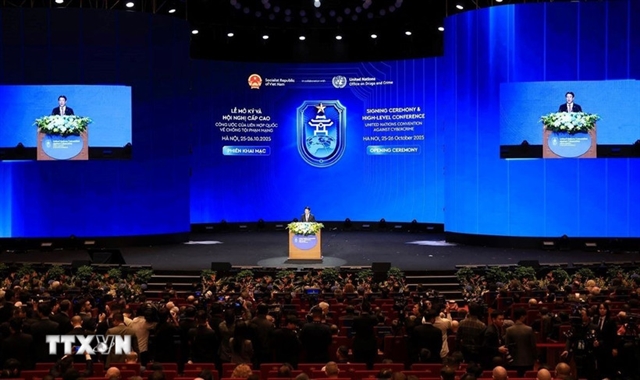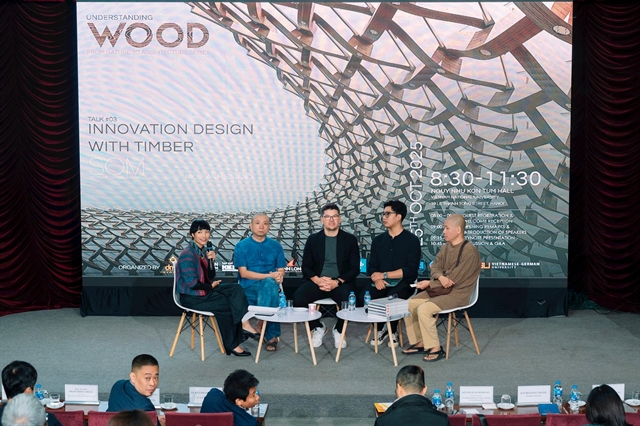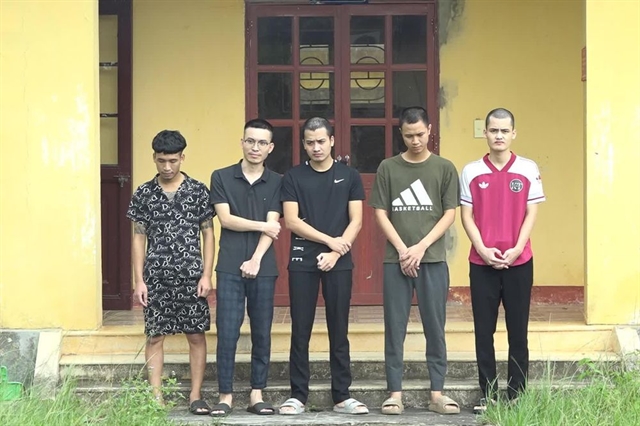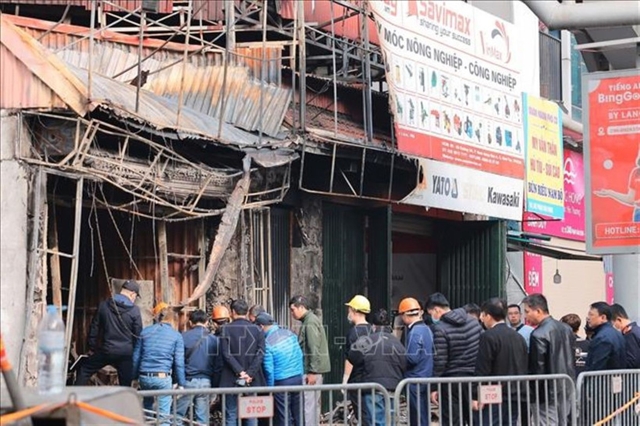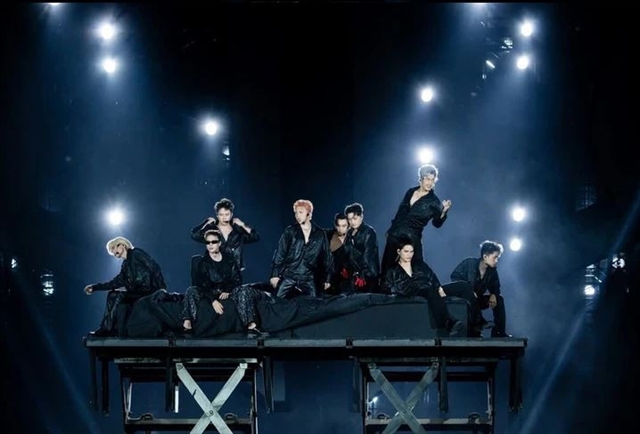

A woman called Andrea Nguyễn has written books about Vietnamese cooking. She believes that the food people eat can tell you a lot about their culture.
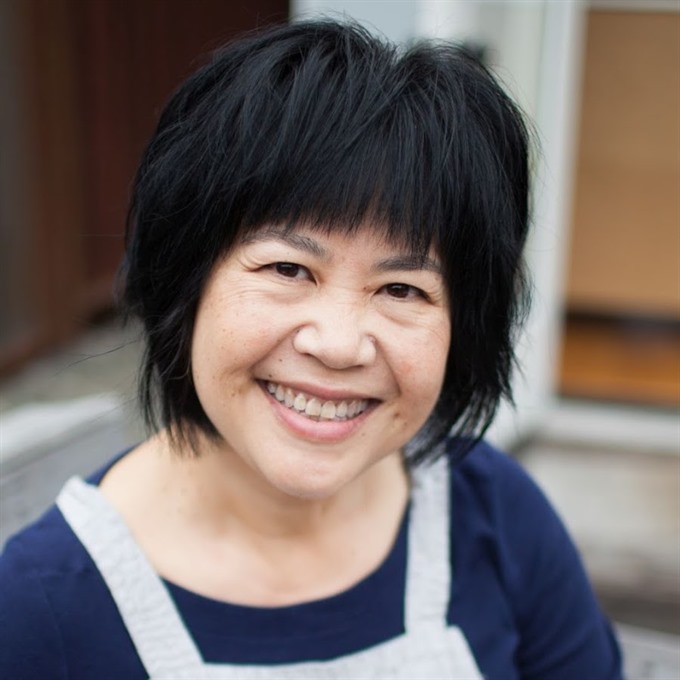 |
| Andrea Nguyễn |
A woman called Andrea Nguyễn has written books about Vietnamese cooking.
She believes that the food people eat can tell you a lot about their culture.
Her love of cookbooks started when she was a child.
She also learnt a lot from her mother.
Andrea Nguyễn has authored many English books featuring Vietnamese cuisine that are more than cook books, offering glimpses into national history, culture and traditional customs. Born Nguyễn Quỳnh Giao in 1969 in Việt Nam, the California-based author has several acclaimed books to her credit, including Asian Dumplings, Asian Tofu, The Banh Mi Handbook, Into the Vietnamese Kitchen and The Pho Cookbook. She has written for many magazines and newspapers, created the Asian Market Shopper app and set up the vietworldkitchen.com website. She speaks to Minh Thu about the motivation and inspiration for her culinary stories.
Inner Sanctum: How did you develop your passion for cooking and feel the need to write so many cookbooks?
I have been reading cookbooks since I was about 10 years old. Cookbooks were a way for me to learn about other cultures through their cuisines. When I did not see a cookbook about Vietnamese food the way my family and other Vietnamese-American brethren prepared it, I wanted to write my own. That journey started many years ago. Who thought I would be writing cookbooks for a career? I am fulfilling a childhood dream.
Inner Sanctum: Who influenced and inspired you to cook?
My mother taught me how to cook when I was young. First it was rice, then nước chấm (dipping sauce), and dumplings. She taught me to be detail oriented. She measured with rice balls but also used to scale. She read cookbooks, newspapers, and also wrote down recipes. She was a model for me.
I also watched shows in America. My heroes included good teachers like Julia Child and Irene Kuo, who owned restaurants and wrote great Chinese cookbooks that I learned a lot from.
Inner Sanctum: You had another career. How did that happen, and how did you return to cooking?
Since the age of 10, I’ve been reading and studying cookbooks. I perused cookbooks, both Eastern and Western food, as if they were novels.
I fantasised about doing something in food but I’ve been a bank examiner, university administrator, and communication consultant. But in the midst of those careers, I cooked and read the classics as well as new interpretations of food, trying to find cultural and culinary links between cuisines. I read Vietnamese cookbooks in English and Vietnamese, trying to figure out how to best present the unfamiliar and ‘exotic’ to a broad audience of cooks.
To test my determination, I cooked professionally for one year in the early 1990s. It was the hardest work I’d ever done. Hands down. My father offered to put me through cooking school, a bold move on his and my mom’s part since they didn’t initially take to me getting a university degree. But I demurred and figured that I’d be better off in something more conventional, so I got a graduate degree and forged a career as a communication consultant for clients in education. I wrote as a freelancer on the side to hone my writing and research skills and eventually built a website and won a cookbook contract with Ten Speed Press for my debut work, Into the Vietnamese Kitchen. It was the book that I’d been wanting to write since I was 10.
I have no formal culinary training. I never went to cooking school. My lifelong curiosity about food, cooking, and culture fuels my work. At the end of the day, my aim is to capture the human connections to food and demystify Asian food without dumbing it down.
Inner Sanctum: So Into the Vietnamese Kitchen reinforced your confidence and passion?
It was published in 2006, a landmark publication with over 175 recipes. The work is the first comprehensive full-colour cookbook devoted to Vietnamese food in the English language. Leading food writers have praised the book for its attention to detail, accessibility, and thorough research. I work to demystify Vietnamese cuisine while bridging culinary traditions with contemporary practices.
Another one about the Vietnamese baguette, The Banh Mi Handbook, was released in 2014. It’s my way of drawing people into Vietnamese cooking through the ease and simplicity of making a darn good sandwich. Many people are interested in bold flavours and bánh mì sandwiches are a fabulous way to enjoy and explore them.
Inner Sanctum: Can you share some memories of your learning to cook?
Rice was the first thing I learned to cook from my mother. She made me wash the rice 10 times before I could add water to cook it. I made the rice for our family and my father liked his rice dry. If the rice was wet and mushy, I apologised to the family. But then I kept practising and that is what cooking is about — practising and learning so you can develop skills. Edible mistakes get eaten up and you keep moving forward.
Inner Sanctum: How would you position the traditional cuisine of Việt Nam in the modern society ?
Vietnamese food is very popular now in the US. People are very curious about the flavours, ingredients, and techniques. The general healthiness of the cuisine is also attractive. Many people are travelling to Việt Nam and going to Vietnamese restaurants here in America. They want to make Vietnamese food part of their regular lives. It is an exciting time for Vietnamese food culture. Vietnamese food is just as good as any other cuisine.
Inner Sanctum: There is an opinion that women are not going to be masters at cooking anymore, because there are so many restaurants and other options now. What do you think?
The best food is made at home because you can make small amounts of food and really perfect them. You can control flavours, apply good techniques and use excellent, fresh ingredients.
I know many home cooks that make food that is just as good or better than restaurant food. Just because you can go to restaurant for convenience does not mean that the restaurant food is better for you. It is healthier and more economical to cook at home. I have restaurant chef friends who come to my house to cook and eat with me.
Inner Sanctum: Your latest cookbook on phở introduces both traditional and adventurous recipes. Is this to make phở more popular in countries where the people’s tastes are different from the Vietnamese?
Phở is very adaptable and customisable. It was created by resourceful cooks who had little to work with, and there has been a lot of innovation over the past 100 plus years. In Việt Nam, I’ve eaten phở cuốn (summer roll), phở gà trộn (chicken noodle in sauce), and stir-fried phở -- non-traditional phở dishes.
In America, we have phở dumplings, phở - bánh mì and phở burritos. My aim in writing The Pho Cookbook is to tell the story and history of phở and then to invite others to learn the foundations for making it, and then create their own phở flavours and dishes.
Americans are making excellent phở at home now. Many tell me that their phở tastes better than the phở at restaurants.
By cooking Vietnamese food, people learn about the rich and diverse culture of the country. Ultimately, there is better human understanding. That is why I write my cookbooks. VNS
GLOSSARY
Cookbooks were a way for me to learn about other cultures through their cuisines.
Cuisine means cooking.
When I did not see a cookbook about Vietnamese food the way my family and other Vietnamese-American brethren prepared it, I wanted to write my own.
Brethren means people who feel as close as family.
She taught me to be detail oriented.
To be detail oriented means to pay attention to detail and to focus on things very closely.
I perused cookbooks, both Eastern and Western food, as if they were novels.
To peruse cookbooks means to spend lots of time reading them carefully.
Novels are books containing stories that are not true.
I fantasised about doing something in food but I’ve been a bank examiner, university administrator, and communication consultant.
To fantasise means to dream about things that are your greatest wishes.
But in the midst of those careers, I cooked and read the classics as well as new interpretations of food, trying to find cultural and culinary links between cuisines.
Culinary means to do with cooking.
I read Vietnamese cookbooks in English and Vietnamese, trying to figure out how to best present the unfamiliar and ‘exotic’ to a broad audience of cooks.
If something is unfamiliar to you, you do not know much about it.
Exotic means foreign and often interesting.
But I demurred and figured that I’d be better off in something more conventional, so I got a graduate degree and forged a career as a communication consultant for clients in education.
To demur means to show that you are not keen on something.
I wrote as a freelancer on the side to hone my writing and research skills and eventually built a website and won a cookbook contract with Ten Speed Press for my debut work, Into the Vietnamese Kitchen.
A writer who is a freelancer is not employed by a publication but sells his, or her, work to whichever publication may wish to use it.
I have no formal culinary training.
Formal means ordered and traditional.
My lifelong curiosity about food, cooking, and culture fuels my work.
To have curiosity means to want to know all about what is happening around you.
At the end of the day, my aim is to capture the human connections to food and demystify Asian food without dumbing it down.
To demystify something means to make it easier to understand.
The work is the first comprehensive full-colour cookbook devoted to Vietnamese food in the English language.
Comprehensive means “in full”, with nothing left out.
Devoted means loyal.
Leading food writers have praised the book for its attention to detail, accessibility, and thorough research.
Accessibility means being able to reach things.
I work to demystify Vietnamese cuisine while bridging culinary traditions with contemporary practices.
Contemporary means “to do with the present”. In other words, to do with “now”.
Another one about the Vietnamese baguette, The Banh Mi Handbook, was released in 2014.
A baguette is a type of French bread.
Edible mistakes get eaten up and you keep moving forward.
If something is edible you can eat it.
Phở is very adaptable and customisable.
If something is adaptable, it can be changed to fit different uses.
If something is customisable it can be made to suit a certain need.
WORKSHEET
State whether the following sentences are true, or false:
© Duncan Guy/Learn the News/ Viet Nam News 2017
1. False; 2. True; 3. True; 4. False; 5. True.

